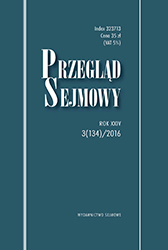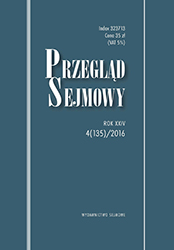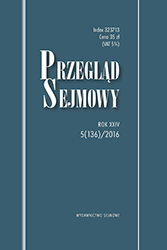Author(s): Jerzy Zajadło / Language(s): Polish
Issue: 4/2016
The main aim of this article is to analyze the small work of Carl Schmitt “On the three types ofjuristic thought”, fi rst published in 1934. In the literature of the subject, the German scholar is knownprimarily as a political philosopher and creator of the original, although controversial, ideas andconcepts, including: the nomos, the political, the friend and enemy relationship, a state of emergency,sovereignty and political theology. Not forgotten is also the support Schmitt gave the Nazi regimeafter Hitler came to power. In the fi rst two parts of the article, the author reviews, on the one hand,the current state of research on the thought of the German scholar and, on the other hand, presentshis short biography and his achievements as a writer. All of this, however, is only the backgroundfor a general review and analysis of the origins and content of the work of Schmitt of 1934. Theauthor emphasizes the unique character of that small volume book as compared to other works ofthe German scholar. In the book, Schmitt rather appears to us as a theorist and philosopher of law,who goes beyond a dispute between legal positivism and natural law, and proposes a particular modeof thinking based on legal institutions. His sources of inspiration include two of his contemporaryauthors, representing institutional theory of law, Maurice Harriou and Santi Romano. According tothe author of the article, it is hard to claim on this basis that Schmitt developed his own theory andphilosophy of law.
More...



